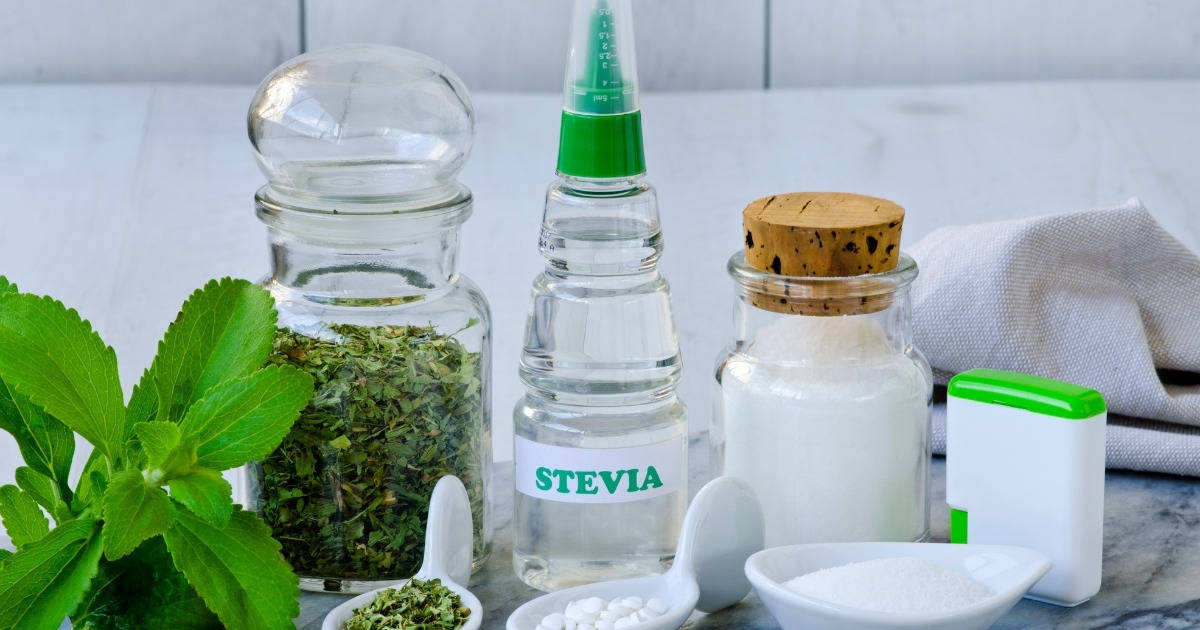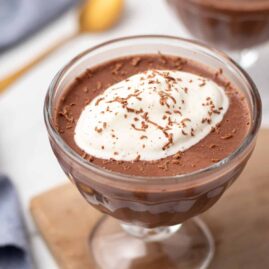If you have diabetes, you know that managing the disease takes a lot of diligence in terms of monitoring the medication(s) you take, how you exercise, and (perhaps most importantly) how you eat.
This includes being extra aware of how much sugar (especially added sugar!) is in your diet.
While there have been many popular sugar substitutes over the years, including Splenda (sucralose) and Equal (aspartame), one of the most popular recently is stevia, made from the plant of the same name.
But what is stevia, and is it a healthy sugar alternative for people with diabetes? What are the benefits and what are the risks?
This article will explore everything you need to know about this popular sugar alternative and how (and if!) you should incorporate it into your diet.

What is stevia?
Stevia is a zero-calorie sweetener with no nutritional value, made of steviol glycosides extracted from the leaves of the Stevia Rebaudiana plant.
The plant is primarily grown in Brazil, Paraguay, Japan, and China. China is currently the biggest exporter of stevia.
Stevia is about 200-300 times sweeter than traditional table sugar and has been used for centuries as a sweetener and herbal remedy.
The FDA considers both rebaudioside A and other steviol glycosides such as stevioside as “generally recognized as safe” (GRAS).
Most commercially available stevia sweeteners are a blend of stevia with low to no-calorie sweeteners like erythritol, but some are also blended with dextrose, so it’s important to read the nutrition label.
People, especially people with diabetes, use stevia in things like coffee, tea, oatmeal, and on top of fruit as an extra sweet dessert.
Is stevia safe to eat?
According to the FDA, safe, daily consumption for humans is 4 milligrams (mg) per kilogram (kg) of body weight. When used to sweeten food, it is safe for humans to consume.
While some studies have found potential side effects in laboratory animals (mostly mice) when huge amounts of the extract are consumed, most of that research has since been disproven.
Negative side effects of eating stevia
However, you may experience several side effects if you eat stevia. Some side effects may include the following:
Gastrointestinal (GI) problems
People who use stevia excessively (and are sensitive to sugar alcohol) may experience issues such as bloating, nausea, indigestion, diarrhea, cramping, and vomiting.
If you experience these symptoms, you may need to stop eating stevia or talk with your doctor about the symptoms you’re experiencing.
Low blood pressure
Stevia acts as a vasodilator, which causes the blood vessels to widen and lower blood pressure.
While this is normally seen as a benefit, long-term use of stevia (especially if you currently have lower blood pressure or are on blood pressure lowering medications) should be discussed with your doctor.
If you currently struggle with high blood pressure, this may actually be a benefit if you start to consume stevia regularly.
Endocrine disruption
Steviol glycosides, a type of steroid, can interfere with the hormones of the endocrine system.
A study in 2016 found that when human sperm cells were exposed to steviol glycosides, they experienced an increase in progesterone production, which may be harmful to human health.
Talk with your doctor if you have these concerns. Common side effects of increased progesterone production include anxiety, agitation, breast swelling and tenderness, depression, fatigue, and weight gain.
What are the benefits of stevia?
For people with diabetes, however, eating stevia may have many benefits. The following are the benefits of eating this extract, especially if it’s replacing traditional table sugar:
Better blood sugars
Research has shown that stevia does not contribute any calories or carbohydrates to the human diet, and it has no effect on either blood sugar levels or insulin response, which is a huge win for people with diabetes.
You can sweeten something up (like oatmeal, for instance), without adding any additional carbohydrates, which can make not only blood sugars better, but diabetes management easier overall, which is a huge win!
Aid in weight loss
Replacing all of the added sugar in your diet with stevia may help you lose weight. Sugar has 4 calories per gram (as opposed to 0 calories per gram of stevia), which can add up quickly.
If you replace all of those carbohydrates and calories with a sugar-free alternative, you can lose weight.
If, however, you feel like you’re “earning” an unhealthy food item by eating something “healthier” with stevia added instead of sugar, eating stevia for weight loss may not be effective.
Overall, it’s best to just be mindful of the amount of added sugar and calories you’re eating, and replace all sugar-sweetened foods and beverages with either unsweetened versions or sugar replacements (like stevia) if you’re looking to lose some weight.
While stevia in particular has not yet been studied, studies show that aspartame can help people lose weight when replacing sugar in their diet with it.
Improved dental health
Replacing sugar with stevia can help you have healthier teeth and gums, too! Sugar is damaging to oral and dental health; it causes unnecessary cavities and premature tooth decay, and may even contribute to gingivitis.
Stevia has been found to reduce bacterial formation in the mouth, helping to prevent both cavities and gum disease. In fact, it’s often added as a safe sweetener to mouthwashes and toothpaste!
May help improve skin health
Stevia’s antibacterial properties can also help skin health, helping to treat conditions such as eczema and dermatitis.
Topical application of stevia stops the spread of surface-level bacteria and acts as a steroid to bring relief to many people who suffer from these conditions.











Thomas
I am type 2 diabetic since 2020,and I have been using Splenda for my Sweetener as stevia leaves a bitter taste in my mouth, however lately I have been receiving some rather disturbing emails on Splenda of being a drastic destroyer of our DNA as well as being the cause of cancer! I have been following your articles about diabetes for awhile and never read anything like that being written about Splenda. I have also followed the diabetes strong recipes in which I use Splenda. Can you please shed some light on these rumors or articles that are coming from within America.
Tobias Oerum
Hi Thomas, we are keeping a close eye on the research about artificial sweeteners coming out. So far, the studies only show effect on DNA and cancer in test tube environments, not on real living beings, and only with very high amounts of sweeteners. The consensus in the scientific diabetes community is therefore that it’s too early to recommend that people with diabetes stop eating sweeteners (because sugar, honey, etc. also aren’t good when you have diabetes).
Here is a quote from Dr. John Damianos, a hospital resident at Yale School of Medicine, that sums it up well: “the findings raise potentially concerning findings that deserve further study, but do not practically reflect what occasional or even frequent ingestion of sucralose-sweetened food and beverages have on health”.
Source: https://www.medicalnewstoday.com/articles/sucralose-found-in-common-sweetener-damages-dna-may-cause-cancer
Steve
Stevia is not for me. I have tried a couple of powdered brands and one liquid drops in a couple of recipes. It is so bitter tasting and not sweet at all.
emily
I have been consuming stevia as a non-diabetic for long time. I like it better than sugar.
Stylelytical
I never consume stevia in my life and I thinking of using it as it has zero-calorie. Thanks for this article.
Leather Exotica
I have been consuming stevia as a non-diabetic for long time. I like it better than sugar.
Marge
Is stevia a safer alternative than Splenda? I did not see that mentioned in the article. I prefer stevia and only use it in my morning coffee. My husband likes Splenda which gives me bad side effects.
Christel Oerum
Both are considered safe sweeteners. From a blood sugar perspective, you want to look out for any “other ingredients” added that can have a blood sugar impact